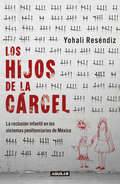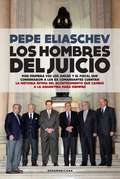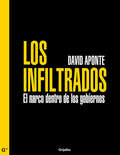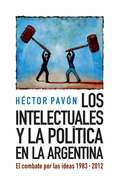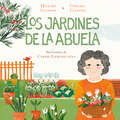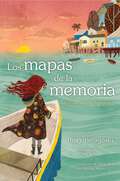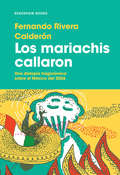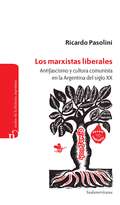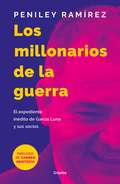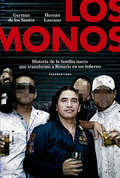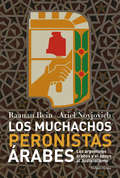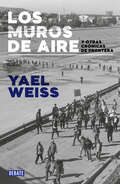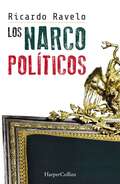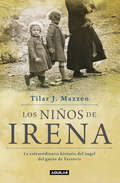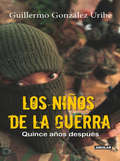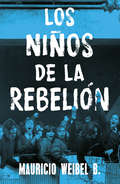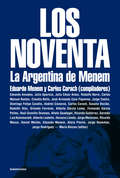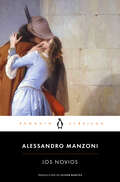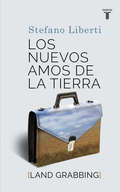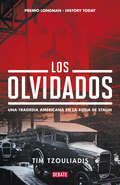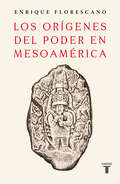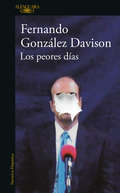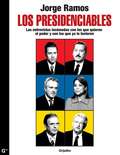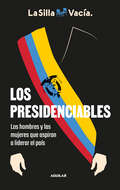- Table View
- List View
Los hijos de la cárcel: La reclusión infantil en los sistemas penitenciarios de México.
by Yohali ReséndizCuando un niño vive en una cárcel, recibe, sin merecerlo, dolor, amargura y violencia: está condenado con su madre por un delito que él no cometió. En México, si una mujer es encarcelada y tiene hijos puede vivir con ellos en prisión hasta que el menor cumpla tres años. Lo mismo sucede si la mujer decide embarazarse: vivirá con su hija o hijo hasta que cumpla esa edad. Llegado el momento, y si ningún familiar se hace cargo, el DIF recibe a los niños. Ésta es, sin duda, una situación que encierra muchos cuestionamientos. Los hijos de la cárcel es una investigación implacable, valiente y profunda sobre el destino de los pequeños que conocieron el encierro y su entorno de violencia, drogadicción, sexualidad, amargura y depresión. La indagación revela que muchos niños se convierten en delincuentes, viven con traumas severos y reciben castigos brutales sin merecerlo; así, cuando seintegran a la sociedad, su alma está muerta. ¿Qué hacen las autoridades al respecto? ¿Por qué el sistema escolarizado en las cárceles no se ha generalizado en todo el país? ¿Por qué los niños pagan la condena de los adultos? ¿Por qué no existe un activismo asertivo ante este desgarre social? En una época donde la defensa de los derechos humanos, de la equidad de género y de la tolerancia es una constante, ¿por qué nadie presta atención a esta infancia triste que, en lugar de sonrisa, muestra una herida abierta?
Los hombres del juicio
by Pepe EliaschevLa historia íntima del juicio a las Juntas Militares contada por susprotagonistas. Una mañana de otoño de 2010 el juez Ricardo Gil Lavedra citó a PepeEliaschev en su estudio en la avenida Santa Fe. Ex integrante de laCámara Federal que juzgó a las juntas militares en 1985, queríaconfiarle al periodista un proyecto. Pocos meses después, el 9 dediciembre, se cumplirían veinticinco años del juicio que condenó a losautores del mayor plan criminal de la historia argentina. El fiscalJulio Strassera y los seis integrantes de la Cámara (Gil Lavedra, LeónCarlos Arslanian, Guillermo Ledesma, Jorge Torlasco, Jorge Valerga Aráozy Andrés D´ Alessio, que falleció en 2008) se habían seguido viendoperiódicamente durante un cuarto de siglo. «Siempre supimos que laverdadera historia del juicio aún no había sido contada y siemprepensamos que algún día la escribiríamos. Pero el tiempo ha pasado y yaes evidente que no es algo que haremos nosotros», le confesó Gil Lavedraa Eliaschev. Por unanimidad, los jueces lo habían elegido paraproponerle esa difícil tarea. El resultado es el libro que el lectortiene en sus manos, una crónica conmovedora e iluminada sobre la mayorhazaña civil de nuestro país, una proeza que no ha sido aúnadecuadamente reconocida por la sociedad argentina, aunque seareferencia obligada en medios jurídicos extranjeros. «Nadie en el mundohizo tanto, tan rápido y de manera tan contundente», sostiene el autorsobre la sentencia firmada en 1985. Este es, por primera vez, eltestimonio crudo de aquellos señores jueces que no sospechaban lo que lahistoria les deparaba cuando fueron llamados a asumir tan enormedesafío, al que respondieron valiente y exitosamente.
Los infiltrados
by David AponteHace poco más de dos años la dea detectó una filtración en la embajadade Estados Unidos en México por parte de operadores del cártel deSinaloa. Desde entonces, se ha descubierto la intricada trama deespionaje y complicidades existente entre militares, policías y elcrimen organizado, que va desde lo más simple como comprar ladesaparición de un expediente, hasta lo más absurdo: delincuentesofreciendo apoyo tecnológico para que las fuerzas de seguridadinvestiguen y terminen con la actividad de sus competidores; una guerrade criminales dentro de la batalla institucional contra los capos delnarco.Sin embargo, en este libro del periodista David Aponte lo que menosimporta son las suspicacias o ideas de conspiración que puedan despertaren el lector; los retratos de Los infiltrados les devuelve a estostestigos protegidos su condición de seres de carne y hueso, mostrando elenjambre de codicia que los envuelve desde que cruzan de bando, hasta laendeble estructura que busca juzgarlos, que debe protegerlos y queotorga privilegios, inmunidad y dinero de las arcas oficiales.Este libro recoge los testimonios de algunos de estos personajes quefueron detenidos en la Operación Limpieza, un proceso en el cual sedescubrió la red de venta de información y compra de favores por partede militares y policías entre los que están procesados penalmenteincluso miembros de la casta más alta (como el ex subprocurador de laPGR, Noé Ramírez Mandujano, y el ex director técnico de la SIEDO, MiguelColorado González). Aponte nos revela lo que puede ser el mayor hueco enel combate al crimen organizado: el poder de corrupción del narco, ladebilidad de las estructuras de los organismos de seguridad y lafragilidad de sus sistemas de control, que a la larga han provocadooperativos fallidos y una guerra que cada día parece más perdida.
Los intelectuales y la política en la Argentina: El combate por las ideas 1983-2012
by Héctor Pavón¿Cuál es la influencia real de los intelectuales en el mundo de lapolítica em las ultimas décadas? La Argentina posee una frondosa tradición de pensamiento político,poblada de hombres y mujeres que han diseñado planes, proyectos,estrategias presidenciales, modelos de país. Artistas, escritores,poetas, docentes, investigadores -algunos de ellos participaron degobiernos, fueron revolucionarios, se volvieron reformistas, seadaptaron a las modas, se hicieron oficialistas y también opositores,según la pasión de cada época o la pertenencia individual.Una pregunta recorre estas páginas: ¿cuál es la influencia real de losintelectuales en el mundo de la política? Héctor Pavón busca responderlacon esta reveladora y minuciosa investigación que incluye lostestimonios en primera persona de los protagonistas más relevantes de laescena cultural nacional de las últimas décadas.Entre la utopía y la acción, entre la adulación mutua y la decepción,entre el acompañamiento y la crítica, los intelectuales transitan uncamino siempre difícil: pensar y ser escuchados. Nunca es una tareasencilla. Solo a veces tienen éxito.
Los jardines de la abuela
by Chelsea Clinton Hillary Clinton¿Qué compartes con las personas a las que quieres?Abuela Dorothy compartió su amor por los jardines con su hija Hillary y con su nieta Chelsea. Les enseñó que los jardines son lugares mágicos de aprendizaje, asombrosos espacios para el descubrimiento, puntos de encuentro con la familia y bellas áreas donde compartir historias y celebrar acontecimientos especiales. Pero, sobre todo, les enseñó que en su jardín su amor crecía y florecía.En esta inspiradora y reconfortante historia de madre-hija, Hillary Rodham Clinton y Chelsea Clinton se unen para mostrar a los lectores cómo compartir las cosas que amamos con las personas que queremos puede crear fuertes y eternos vínculos entre generaciones.
Los mapas de la memoria: Regreso al cerro Mariposa (The Butterfly Hill Series)
by Marjorie AgosinIn this &“captivating and exquisite&” (Kirkus Reviews, starred review) sequel to the Pura Belpré Award–winning I Lived on Butterfly Hill, thirteen-year-old Celeste Marconi returns home to Chile and after the dictator is removed, and makes it her mission to rebuild her community and find those who are still missing.During Celeste Marconi&’s time in Maine, thoughts of the brightly colored cafes and salty air of Valparaíso, Chile, carried her through difficult, homesick days. Now, she&’s finally returned home to find the horrible years of the dictatorship has left its mark on her once beautiful and vibrant community. Determined to help her beloved Butterfly Hill, she encourages and joins her neighbors in fighting to regain what they&’ve lost. But more than anything, Celeste wishes she could find her best friend, Lucilla, who was one of thousands of people who &“disappeared&” during the dictatorship, who hasn&’t been heard from in over a year. She joins protests for information, but the trail seems cold—until she receives a letter that changes everything. This sets Celeste off on her biggest adventure yet, where she&’ll uncover more heartbreaking truths of what her country has endured. But every small victory makes a difference, and even if Butterfly Hill can never be what it was, moving forward and healing can make it something even better.
Los mariachis callaron: Una distopía tragicómica sobre el México del 2026.
by Fernando Rivera CalderónMéxico, 2026: todo lo que podía salir mal, salió peor. ¿Novela futurista o simplemente profética? ¿Divertimento disparatado o frío análisis sociopolítico? Ciudad de México, año 2026. Kalelia, una joven de 25 años, regresa al país después de casi una década fuera para asistir al funeral de su padre. Se encuentra con una ciudad que volvió, a medias y a la mala, a su condición lacustre y que vive en penumbra por la erupción del volcán Popocatépetl. Cuitláhuac Blanco, antigua gloria del balompié nacional, es el presidente de la nación. La realidad naufraga en sí misma, pero a nadie parece importarle, pues en pocos días comenzará el Mundial de futbol México 2026 y ¡ahora sí vamos a ganar! Kalelia quiere escapar lo más pronto posible de esa sucursal del Apocalipsis, pero no será tan fácil: la repentina muerte de Andrés Miguel López Labrador, eterno candidato y santo civil, lo cambiará todo...
Los marxistas liberales: Antifascismo y cultura comunista en la Argentina del siglo XX
by Ricardo PasoliniLucha antifascista y cultura comunista en la Argentina del siglo XX. ¿Un marxismo liberal? Sí, en la historia política argentina del siglo XXse advierte ese vínculo evidente que faltaba explicar: por qué en laesfera cultural del Partido Comunista Argentino, fue un marxismo decorte liberal y no otro el que imprimió por largo tiempo el sellodistintivo en las imaginaciones políticas de sus intelectuales ymilitantes.Ricardo Pasolini analiza el itinerario de una generación que arribó alcampo de la cultura en el momento en que en el mundo se organizaba lalucha contra el fascismo. El autor demuestra que la acción política ycultural de los intelectuales comunistas en el largo plazo se hallafuertemente condicionada por el impacto que tendrá en ellos el "momentoantifascista de la cultura argentina". Una tesis que responde a unapregunta histórica muy presente en términos morales en las diferentesfamilias políticas argentinas: ¿por qué los comunistas se colocaron enel campo político del antiperonismo?
Los millonarios de la guerra: El expediente inédito de García Luna y sus socios
by Peniley Ramírez«Peniley Ramírez ha escrito un estremecedor thriller de no ficción. Siempre creímos que la llamada guerra contra el narco había dejado sólo incontables víctimas y perdedores. Con rigor y profundidad, Peniley desvela quiénes -como el propio Genaro García Luna, su primer artífice- medraron con la #guerra# y se convirtieron en sus espurios, obscenos ganadores.» Jorge Volpi En diciembre de 2006, Felipe Calderón declaró la «guerra contra el narco»: una era de sangre y fuego que ha dejado cientos de miles de muertos... y cientos de millones de dólares para unos pocos. En esta investigación #realizada a lo largo de 8 años, en 4 países y con más de 17 mil documentos# la periodista Peniley Ramírez desnuda a quienes se han forrado de dinero gracias a esa industria: políticos, proveedores, brokers, espías, empresas de seguridad, asesores, mandos policiacos, jefes militares y mercaderes de armas y de humo. Genaro García Luna es sólo uno de ellos, casi el único que ha caído en desgracia. Este libro demuestra que su vida y obra ejemplifican todo un sistema, que persiste hasta hoy, en el que para ganar millones no se necesita ganar la «guerra».
Los monos: Historia de la familia narco que transformó a Rosario en un infierno
by Germán De los Santos Hernán LascanoLa historia de la familia Cantero, la organización criminal que dominó el tráfico de drogas en Rosario con métodos de una violencia tan extrema que transformó la ciudad en un escenario de feroces enfrentamientos y que -aún hoy- hace temblar su sistema politico. El ascenso de la familia Cantero dentro del hampa es un caso único. Delincuentes comunes y marginales en sus orígenes, el narcotráfico los volvió ricos en pocos años. Brutales, despiertos y ambiciosos, corrompieron a la ciudad y dieron batallas sangrientas, fustigando y asesinando a sus competidores. Entonces, a Rosario empezaron a llegar periodistas de todo el mundo para documentar su colapso. «La saga de Los Monos y la explosión del narcotráfico en la ciudad de Rosario componen un friso laberíntico, atravesado por múltiples conflictos. Sus líneas se siguen en el rastro de sangre que dejan las víctimas en esa especie de guerra de guerrillas que libraron, en principio, en el barrio Las Flores, y en las posteriores vendettas con que se gestionaron los negocios. Una historia difícil de contar, donde es frecuente perderse en detalles y notas de color que distraen de sus núcleos de sentido. Hacía falta un libro que la expusiera así, con la cercanía necesaria para observar a sus protagonistas y sus escenarios, y la suficiente distancia para comprender sus causas. Tras una exhaustiva investigación del caso, Germán de los Santos y Hernán Lascano -los periodistas que más se ocuparon de estas tramas- logran un relato preciso de los orígenes y el desarrollo de un capítulo central en la historia reciente del crimen.» Osvaldo Aguirre
Los muchachos peronistas árabes: Los argentinos árabes y el apoyo al Justicialismo
by Raanan Rein Ariel NoyjovichBasados en una minuciosa investigación que exhumó documentación inédita en archivos y repositorios de varios países, Raanan Rein y Ariel Noyjovich presentan la primera historia de la relación entre argentinos-árabes y peronismo. Entre las décadas de 1870 y 1930, decenas de miles de árabes abandonaron Oriente Medio para "hacer la América" en la Argentina, donde se rumoreaba que cualquiera podía vivir libremente y prosperar. Los "turcos" que llegaron al puerto de Buenos Aires tuvieron que enfrentar muchas veces el peso del estereotipo prejuicioso. Ya en la década de 1940, Perón, consciente de estos estereotipos, concibió la idea de asociar a los argentinos-árabes con tres características que, juzgaba, los convertían "naturalmente" en perfectos justicialistas: se trataba, en su mirada, de personas de fuertes sentimientos, nítidamente leales y con una vocación irrenunciable por la justicia social. Los argentinos-árabes, por su parte, encontraron en la integración que el peronismo proponía, la posibilidad de hacerse un espacio en la esfera de la política.
Los muros de aire: y otras crónicas de frontera
by Yael WeissDetrás del primer muro había más muro, más rejas, y cámaras y reflectores y sensores de movimiento, además de soldados armados hasta los dientes y helicópteros de caza; no era solo cuestión de saltar y escabullirse en la tierra de la libertad. Esta frontera no era como las de América Central, tan endebles, ni como la que separa a México de Guatemala. En pequeños grupos o tan grandes como para formar caravanas, personas originarias de Centroamérica, y otras partes del mundo, que se dirigen a Estados Unidos, detienen su paso en las ciudades fronterizas de México. Antes y durante la pandemia de covid-19, laescritora Yael Weiss realizó estancias en las principales: Ciudad Hidalgo, Ciudad Juárez, Tenosique, Tijuana y Reynosa, para conocer de primera mano las historias de mujeres, niños y hombres que recorrieron de sur a norte el territorio mexicano, a pesar del miedo a la enfermedad, el hambre, la migra y el narco. Los muros de aire y otras crónicas de frontera es el retrato dinámico de los problemas y los azares de la migración. Un inigualable mosaico de voces que representa una diversidad de experiencias, motivaciones y sueños. Cinco crónicas literarias que nos acercan a los caminos, a los albergues, a sus comedores y dormitorios, pero también a esas zonas grises, tierras de nadie, kilómetros y kilómetros peligrosos de andar o rodear antes de llegar a la línea.
Los narcopolíticos
by Thomas NelsonLos narcopolíticos aborda las historias de personajes que están implicados en la corrupción y el narcotráfico o que recientemente abandonaron sus cargos y enfrentan procesos de investigación y/o juicios por diversos delitos del orden federal.En esta obra se construyen los perfiles criminales de políticos de distintos partidos, trabajados con documentos judiciales, partes de las investigaciones y antecedentes para entender el tamaño de la corrupción que envuelve a quienes nos han gobernado o gobiernan actualmente en el país. Conoceremos quienes son, qué han hecho y cómo gobiernan o están gobernando para entender la aguda crisis que envuelve a los personajes de la política y sus diferentes discursos que se traduce en mera demagogia, discurso barato que, por desgracia, buena parte de la sociedad sigue comprando en cada proceso electoral.Dentro de los perfiles criminales que encontraremos en el libro están el de el de Roberto Sandoval Castañeda, exgobernador de Nayarit; Graco Ramírez, exgobernador de Morelos; Ricardo Monreal; Daniel Cabeza de Vaca, actual gobernador de Tamaulipas; Jaime Bonilla, actual gobernador de Baja California; Miguel Ángel Yunes Linares, exgobernador de Veracruz; Manuel Cavazos Lerma, exgobernador de Tamaulipas y exsenador de la República y algunos más.THE NARCOPOLITICIANSThe narcopoliticians addresses the stories of characters involved in corruption and drug trafficking or who recently abandoned their positions and face investigations and / or trials for various federal crimes.In this work the criminal profiles of politicians from different parties are constructed, working with judicial documents, parts of the investigations and antecedents to understand the magnitude of the corruption that surrounds those who have governed us or currently govern in the country. We will know who they are, what they have done and how they govern or are governing to understand the acute crisis that surrounds the political figures and their different speeches that translates into mere demagoguery, a cheap speech that, unfortunately, a large part of society continues to buy in each electoral process.Among the criminal profiles that we will find in the book are Roberto Sandoval Castañeda, former governor of Nayarit; Graco Ramírez, former governor of Morelos; Ricardo Monreal; Daniel Cabeza de Vaca, current governor of Tamaulipas; Jaime Bonilla, current governor of Baja California; Miguel Ángel Yunes Linares, former governor of Veracruz; Manuel Cavazos Lerma, former governor of Tamaulipas and former senator of the Republic, and some more.
Los niños de Irena: La extraordinaria historia del ángel del gueto de Varsovia
by Tilar J. MazzeoEl testimonio único de la heroína del Holocausto: Irena Sendler. Irena Sendler, "el ángel del gueto de Varsovia", fue una enfermera y trabajadora social polaca que, en la Segunda Guerra Mundial, salvó a más de dos mil quinientos niños judíos condenados a ser víctimas del Holocausto. Llegó a ser candidata al Premio Nobel de la Paz, fue reconocida como Justa entre las naciones y se le otorgó la más alta distinción civil de Polonia: la Orden del Águila Blanca. Esta novela cuenta cómo llegó a convertirse en esa heroína, la historia de la joven y hermosa mujer que tuvo que hacer frente a grandes riesgos, a pesar de los cuales no dudó en poner en peligro su vida para ayudar a salvar las vidas de miles de pequeños. Muchos de aquellos niños están vivos y cuentan su parte de la historia en primera persona. El relato de Irena es una historia de valentía, pero también de un amor imposible y, por supuesto, de una época histórica tan terrible como real: la Segunda Guerra Mundial. Reseñas: "Los niños de Irena teje en una fascinante historia el relato de una ciudad devastada, la depravación nazi y el extraordinario valor físico y moral de aquellos que decidieron responder a la inhumanidad con compasión." Chaya Deitsch, autora de Here and There: Leaving Hasidism, Keeping My Family "Un relato fundamental, aunque aterrador, de la historia del Holocausto que hasta ahora era poco conocido: el de cómo miles de niños fueron rescatados del gueto de Varsovia por una mujer polaca con mucho valor y una extraordinaria calidad moral." Joseph Kanon, autor de Leaving Berlin "Mazzeo relata un rayo de esperanza en tiempos de desesperación en esta biografía conmovedora de una mujer que se negó a darse por vencida." Kirkus Reviews "Si bien esta no es la primera biografía de Irena Sendler, su concisión y legibilidad presentarán a muchos lectores a una mujer realmente valiente y notable, quien inició y encabezó "un gran esfuerzo colectivo de decencia"." Publishers Weekly
Los niños de la guerra: Quince años después
by Guillermo Alfonso González uribeQuince años después de haber escrito Los niños de la guerra, Guillermo González Uribe buscó a sus once protagonistas. Logró hablar con cinco de ellos, hoy adultos. Esta edición recoge los once testimonios originales, los cinco relatos recientes y varios nuevos textos. «El libro Los niños de la guerra adquiere el carácter de una acusación tácita Su propósito es el de dar la palabra a las víctimas de la violencia y de la injusticia social que la genera... ».Rafael Gutiérrez Girardot«Tres veces me he estremecido igual en mi vida. Leyendo el libro La violencia en Colombia que Germán Guzmán, Eduardo Umaña Luna y Orlando Fals Borda publicaron en los años sesenta; leyendo la Crónica de una muerte anunciada, que Gabriel García Márquez publicó en 1981, y leyendo este libro. Los tres nos llevan al fondo del abismo de la condición humana; los tres nos llevan en un viaje al final de la noche».William Ospina
Los niños de la rebelión
by Mauricio WeibelLa historia de los jóvenes que lucharon contra la dictadura mientras se fraguaba el plan para destruir la educación pública Mauricio Weibel revisó miles de documentos secretos del régimen cívico militar de Augusto Pinochet para recrear una parte no contada de nuestra historia, que es también la de su generación. La de aquellos niños de entre doce y diecisiete que abrazaron las utopías y las armas del siglo XX cuando este agonizaba. Es el testimonio de la lucha de los adolescentes que crearon centros de alumnos, organizaron milicias y construyeron alianzas políticas imposibles a nivel nacional, desde demócrata-cristianos hasta marxistas ortodoxos. #En esos tiempos nadie sabía que la CNI espiaba a los niños en los colegios, que los profesores sólo podían ser contratados en los liceos si lo autorizaban por escrito los equipos de inteligencia o que los ministros de Educación portaban armas compradas con fondos públicos. Intuimos siempre que la lucha contra la dictadura era enorme, pero jamás atisbamos todas sus oscuridades#.
Los noventa: La Argentina de Menem
by Carlos Corach Eduardo MenemLa historia definitiva sobre los 90 en la Argentina. Las dos presidencias de Carlos Saúl Menem en la voz de treinta de sus más altos y caracterizados funcionarios de gobierno.Obra de incalculable valor testimonial y documental, se propone como aporte a la comprensión de nuestra historia contemporánea. Carlos Saúl Menem fue presidente de la República entre el 8 de julio de 1989 y el 10 de diciembre de 1999. En esos poco más de diez años el país experimentó el proceso transformador más notable de su historia contemporánea. Profundos cambios en las esferas económica, política, social y cultural dieron lugar a una nueva Argentina que parecía ingresar al siglo XXI con esperanzada vocación de futuro. En efecto, durante los dos mandatos consecutivos de Menem al frente de la Nación, se implementaron reformas y se ejecutaron iniciativas de política pública inéditas en nuestro pasado reciente. El hecho de que las privatizaciones de empresas estatales o la convertibilidad de la moneda se encuentren, como medidas aisladas, entre las primeras cosas que acuden a la memoria colectiva al evocar esos años, habla a las claras de la poca profundidad con que han sido revisados y analizados; al mismo tiempo, señala la necesidad de aportar a su conocimiento a partir de información rigurosa, y a su interpretación desde puntos de vista justos y equilibrados. Con la perspectiva que brindan ya más de veinte años, este libro se propone encarar esa tarea: contar los noventa en primera persona, con datos de primera mano. Los casi treinta autores de esta obra, todos ex funcionarios del presidente Menem, dan cuenta de su labor en sus áreas específicas de gobierno y, en ese mismo gesto, dejan un testimonio de incalculable valor documental e historiográfico, indispensable para las generaciones presentes y las por venir.
Los novios
by Alessandro ManzoniLa novela más importante de la literatura italiana moderna en una versión castellana insuperable Prólogo de Francesco Luti Traducción de Esther Benítez Enmarcada en la ocupación española de Lombardía durante el siglo XVII, Los novios cuenta la historia de Lucía y Renzo, dos enamorados de origen campesino que se ven cruelmente separados y que, en sus intentos por reunirse, se enfrentarán a los peligros e iniquidades de una época despiadada. Con temas como el amor, la fe y el poder, la obra perdura no solo como la más importante de Alessandro Manzoni, sino como el primer y mejor ejemplo de la novela italiana moderna. Nuestra edición ofrece un lúcido prólogo de Francesco Luti, profesor de la Universidad Autónoma de Barcelona, y recupera la aclamada traducción de Esther Benítez, que acerca toda la fuerza del original a los lectores hispanohablantes. La crítica ha dicho:«El clásico literario italiano del siglo XIX conocido por sus vívidas descripciones de la peste de 1630 que destruyó Milán». The New York Times «Los novios está entre las mejores novelas que se han escrito. Es perfecta en el interés de la trama, en la documentación histórica, en la frescura de los personajes, en la soltura de los diálogos, en los cambios de ritmo, en los desenlaces, en la habilidad para penetrar los secretos de los corazones».Rafael Gómez Pérez, aceprensa.org «La obra más importante del escritor italiano Alessandro Manzoni. El libro es el primer exponente de la novela italiana moderna y con la Divina comedia de Dante Alighieri es considerada la obra de la literatura italiana más importante y estudiada en las escuelas italianas».Lecturalia
Los nuevos amos de la tierra
by Stefano LibertiEl primer libro capaz de reunir todas las claves de un fenómeno imparable «Las preguntas que formula Liberti son valiosas y oportunas. En los descubrimientos y testimonios obtenidos en su gira alrededor de nuestra cadena alimentaria, hay lecciones necesarias para prepararnos ante un futuro difícil.»SHAWN DONNAN, Financial Times A lo largo de los últimos años, millones de hectáreas han pasado de manos públicas a manos privadas principalmente en África, pero también en América Latina, el sudeste asiático y Europa del este. A ojos de los gobiernos y de las grandes compañías, adquirir enormes extensiones de tierras en el Tercer Mundo es un acuerdo legítimo. Otros ven en la frenética carrera para adquirir tierras un peligroso ejemplo de colonialismo. ¿Qué lleva a gobiernos e inversores privados a lanzarse a la conquista de tierras en países a menudo tan pobres que no alcanzan siquiera aalimentar a sus propios habitantes? ¿Qué consecuencias tiene esto para las poblaciones locales? ¿Qué aliciente encuentran los representantes de países del Tercer Mundo para ceder soberanía? De los valles de Etiopía a la selva amazónica, pasando por la Patagonia, un congreso en el mejor hotel de Arabia Saudí o la sede del Movimiento de Trabajadores Rurales Sin Tierra en São Paulo, Stefano Liberti ofrece la primera investigación sobre el terreno del land grabbing, acaparamiento de tierras, un alarmante fenómeno que va en aumento. Equilibrado, honesto y repleto de poderosas imágenes, Los nuevos amos de la tierra da voz a los distintos actores y proporciona un completo fresco de la situación. Un libro que cobra especial relevancia en el Día mundial del medioambiente. Reseñas:«Impecable en sus observaciones y lúcido en sus conclusiones. Uno se divierte y aprende en cada página. Mucho más que un gran periodista, Liberti es un verdadero escritor.»Olivier De Schutter, relator especial de la ONU para el derecho a la alimentación «Uno de los más brillantes análisis del capitalismo agrario, es también uno de los reportajes más fascinantes del siglo XXI.»Raj Patel «Un reportaje ejemplar. Riguroso y comprometido.»Corriere della Sera «Liberti escribe con la curiosidad y la pasión de los grandes periodistas del pasado.»Internazionale
Los olvidados
by Tim TzouliadisEn la década de 1930, la Gran Depresión golpea ferozmente a Estados Unidos y miles de jóvenes sin empleo, defraudados por el sueño americano, que ya no ofrece riqueza ni prosperidad, emigran a la Unión Soviética, el paraíso de los trabajadores, en busca de una oportunidad y de un sueño de signo contrario: el socialismo. Sin embargo, la promesa de un futuro mejor pronto se desmorona al comprobar las duras condiciones en las que han de vivir, y muchos de ellos quieren regresar. Es entonces cuando descubren toda la verdad: han perdido la nacionalidad estadounidense y con ella cualquier posibilidad de retorno. Atrapados en el terror estalinista y olvidados por su país de origen, la mayoría de ellos perecerán en la helada estepa rusa, víctimas de la represión y de los campos de reeducación, extenuados por el frío, el hambre y los trabajos forzados. Fruto de años de investigación en archivos internacionales, Los olvidados constituye una extraordinaria aportación a la historia de las barbaries del siglo XX, al tiempo que contribuye a una mejor comprensión de cuestiones eternas como la culpa y la inocencia que aún hoy nos acosan.
Los orígenes del poder en Mesoamérica
by Enrique FlorescanoUn ensayo sobre los fundamentos del poder político en Mesoamérica y una formidable síntesis histórica del México antiguo La formación del Estado es el proceso civilizador que impulsó el desarrollo de Mesoamérica, el origen de su unidad política y de su identidad social y cultural. Los habitantes de estos territorios construyeron el poder que los organizaría y dotaría de identidad basándose en cuatro pilares: el grupo étnico, el territorio o altépetl, la fundación del reino y la centralización del poder. La particularidad de estas cuatro instituciones no radica, sin embargo, en sus orígenes —ya que las cuatro partieron de procesos sociales y políticos tangibles—, sino más bien en su interiorización en el imaginario colectivo, que tomó forma de mitos, símbolos, imágenes y relatos de matiz religioso e ideológico. En este magnífico ensayo, profusamente ilustrado y actualizado de acuerdo con los descubrimientos más recientes, Enrique Florescano trata desde una perspectiva histórica novedosa la formación del Estado en Mesoamérica, desde su aparición en el Preclásico hasta su abrupto final en las trágicas jornadas de 1521, pasando por los reinos mayas, los poderosos Estados de Teotihuacan, Chichén Itzá y Tula, y los reinos militaristas que dominaron el Posclásico, mostrándonos que la historia política puede situarse en el centro del desarrollo social, económico y cultural de los pueblos que habitaron Mesoamérica.
Los peores días
by Fernando Gonzalez Davison«Rodrigo se ilumina y razona que mejor no va a desperdiciar su muerte, la usará para hacer justicia y castigar a los que mataron a su dama. Y quizás se convierta en un mártir... -Eso es: veneno y sacrificio-, murmura». En mayo de 2009 Guatemala se vio sacudida por un acontecimiento que, inesperada y rápidamente, dio la vuelta al mundo: el abogado Rodrigo Rosenberg Marzano fue asesinado en una de las zonas residenciales más cotizadas de la ciudad. Podría haber sido una muerte más en un país con un alto índice de criminalidad e impunidad, pero sucedió algo insólito; el día del funeral un amigo entregó a los asistentes un video en el que acusaba de su muerte al presidente Álvaro Colom, a su esposa y a Gustavo Alejos. ¿Por qué?, porque Rosenberg los hacía responsables del crimen de los Musa -ocurrido semanas atrás- y querían callarlo. Este es el nudo de la madeja que Fernando González Davison va deshaciendo a lo largo de esta novela de no ficción, en la que estas muertes resultan ser la chispa que desencadena todo tipo de maquinaciones, venganzas, manipulaciones, y que al mejor estilo de House of Cards o The Good Wife ponen al descubierto los laberintos del poder.
Los presidenciables
by Jorge Ramos"El libro que todo mexicano debe leer antes de las votaciones de julio de 2012. No hay pregunta prohibida." A partir de esta premisa rebelde, Jorge Ramos, uno de los periodistas mexicanos de mayor credibilidad en todo elmundo, ha entrevistado a los principales aspirantes a la presidencia de México para las elecciones de 2012. Ellos sabían que la entrevista no sería fácil y que incluiría varias preguntas incómodas. Sin embargo, todos hablaron con él: Enrique Peña Nieto, Manlio Fabio Beltrones, Andrés Manuel López Obrador, Marcelo Ebrard, Santiago Creel y Josefina Vázquez Mota. He aquí algunas de las preguntas que les hizo: ¿Por qué parecía no saber de qué murió su esposa? ¿Por qué The New Yok Times lo acusó de colaborar con narcotraficantes? ¿Le afectará para llegar a Los Pinos el hecho de que muchos mexicanos lo consideren un mal perdedor? ¿Se puede ser católico y aceptar el aborto? ¿Qué pasó con el cambio que nos prometió el PAN? ¿Por qué México no ha tenido una presidenta? Y a todos: ¿Se debe negociar con los narcos? ¿Cuánto dinero tiene?... y muchas otras interrogantes difíciles y hasta enojosas. Para contextualizar la realidad política donde se mueven los presidenciables y con ellos millones de votantes, Ramos también incluye entrevistas con los ex presidentes Ernesto Zedillo, Carlos Salinas de Gortari y Vicente Fox, en las cuales les hizo otras preguntas incómodas:¿Si dice ser demócrata por qué aceptó dos dedazos? ¿Por qué permitió que Raúl se enriqueciera? ¿Toma Prozac? Y eso sólo para empezar. Por último, Jorge Ramos reproduce otra esclarecedora entrevista con Felipe Calderón antes de ser presidente; sus respuestas permiten contrastar lo que prometió como candidato frente a lo que ha hecho con el país. Éste es el libro que todo mexicano y todo candidato debe leer antes de las votaciones de julio de 2012. Mientras más conozcamos de los presidenciables más sabremos cómo gobernará el próximo presidente de México. Se trata de un ejercicio esencial para el país. Aquí confluyen el futuro, el pasado y el presente. Aquí conoceremos a quienes quieren gobernar a México, a los que ya lo hicieron y a quien todavía lo está haciendo.
Los presidenciables
by Jorge RamosPrimer libro de entrevistas a los aspirantes a la presidencia de la República en 2012, escrito, por un comunicador mexicano, líder de opinión en la comunidad hispana de Estados Unidos, famoso por sus inteligentes e incisivas preguntas a nuestros políticos. No hay pregunta prohibida. A partir de esta premisa rebelde, Jorge Ramos, uno de los periodistas mexicanos de mayor credibilidad en todo el mundo, ha entrevistado a los principales aspirantes a la presidencia de México para las elecciones de 2012. Ellos sabían que la entrevista no sería fácil y que incluiría varias preguntas incómodas. Sin embargo, todos hablaron con él: Enrique Peña Nieto, Manlio Fabio Beltrones, Andrés Manuel López Obrador, Marcelo Ebrard, Santiago Creel y Josefina Vázquez Mota. He aquí algunas de las preguntas que les hizo: ¿Por qué parecía no saber de qué murió su esposa? ¿Por qué The New York Times lo acusó de colaborar con narcotraficantes? ¿Le afectará para llegar a Los Pinos el hecho de que muchos mexicanos lo consideren un mal perdedor? ¿Se puede ser católico y aceptar el aborto? ¿Qué pasó con el cambio que nos prometió el PAN? ¿Por qué México no ha tenido una presidenta? Y a todos: ¿Se debe negociar con los narcos? ¿Cuánto dinero tiene?... y muchas otras interrogantes difíciles y hasta enojosas. Para contextualizar la realidad política donde se mueven los presidenciables y con ellos millones de votantes, Ramos también incluye entrevistas con los ex presidentes Ernesto Zedillo, Carlos Salinas de Gortari y Vicente Fox, en las cuales les hizo otras preguntas incómodas: ¿Si dice ser demócrata por qué aceptó dos dedazos? ¿Por qué permitió que Raúl se enriqueciera? ¿Toma Prozac? Y eso sólo para empezar. Por último, Jorge Ramos reproduce otra esclarecedora entrevista con Felipe Calderón antes de ser presidente; sus respuestas permiten contrastar lo que prometió como candidato frente a lo que ha hecho con el país. Éste es el libro que todo mexicano y todo candidato debe leer antes de las votaciones de julio de 2012. Mientras más conozcamos de los presidenciables más sabremos cómo gobernará el próximo presidente de México. Se trata de un ejercicio esencial para el país. Aquí confluyen el futuro, el pasado y el presente. Aquí conoceremos a quienes quieren gobernar a México, a los que ya lo hicieron y a quien todavía lo está haciendo.
Los presidenciables: Los hombres y las mujeres que aspiran a liderar el país
by La Silla Vacía¿QUIÉNES SON LOS PERSONAJES QUE DEFINIRÁN EL PANORAMA POLÍTICO DE COLOMBIA EN LOS PRÓXIMOS AÑOS? ESTAS SON SUS HISTORIAS. David Barguil Íngrid Betancourt Sergio Fajardo Juan Manuel Galán Alejandro Gaviria Federico Gutiérrez Rodolfo Hernández Francia Márquez Enrique Peñalosa Gustavo Petro John Milton Rodríguez Óscar Iván Zuluaga
